NTTDocomo
Latest
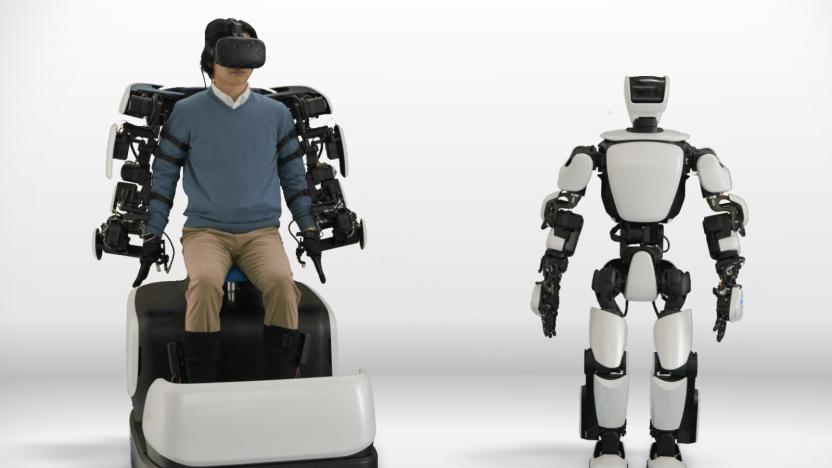
Toyota untethers its T-HR3 humanoid robot thanks to 5G
Toyota just brought your dreams of an Avatar-like proxy one step closer to reality. Teaming with NTT Docomo, it remotely controlled its T-HR3 humanoid robot over a 5G network from a distance of 10 kilometers (6.2 miles). So far the bot, first unveiled a year ago, has only been controlled over a direct wired connection. "This time, with an eye toward improved use in practical environments, the T-HR3 was successfully controlled wirelessly," Toyota said in a press release.
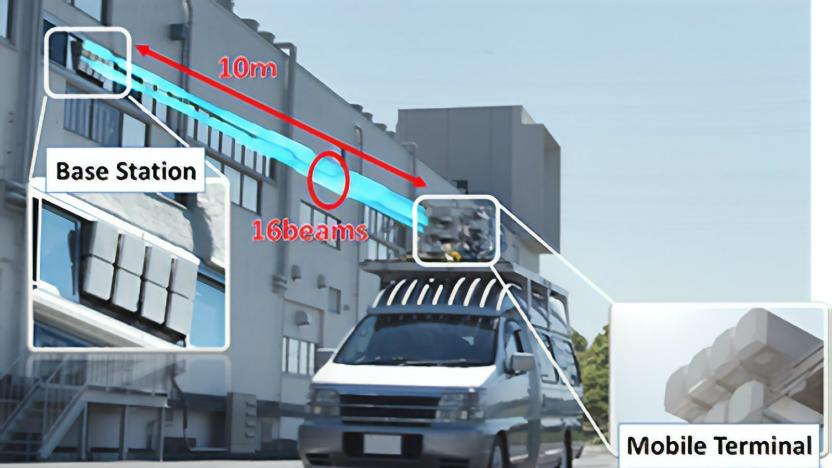
NTT DoCoMo and Mitsubishi hit fastest 5G in-car speeds yet
With the first 5G phones expected in 2019, carriers in the US and abroad are busy laying the groundwork for faster data speeds. Japan's three biggest mobile networks are aiming for a similar timeframe, a year ahead of their original 2020 schedule, to coincide with the Rugby World Cup. One of the country's leading carriers, NTT DoCoMo, has now announced a 5G milestone with the help of Mitsubishi Electric. Together they hit 27Gbps during outdoor trials in Japan's Kanagawa Prefecture.

Kyocera releases tiny e-paper companion phone in Japan
If you've been curious as to what Instagram might look like on an e-paper screen and happen to live in Japan, the Kyocera Card Keitai KY-01L might be of interest. It's a companion device that's supposed to be a sidekick to a beefier mobile phone. The KY-01L is really small -- not too much larger than a credit card. It's about 9 centimeters tall, 5 centimeters wide, 5 millimeters thick and weights in at a miniscule 47 grams. It has a standby time of 100 hours and a continuous talk time of 110 minutes.
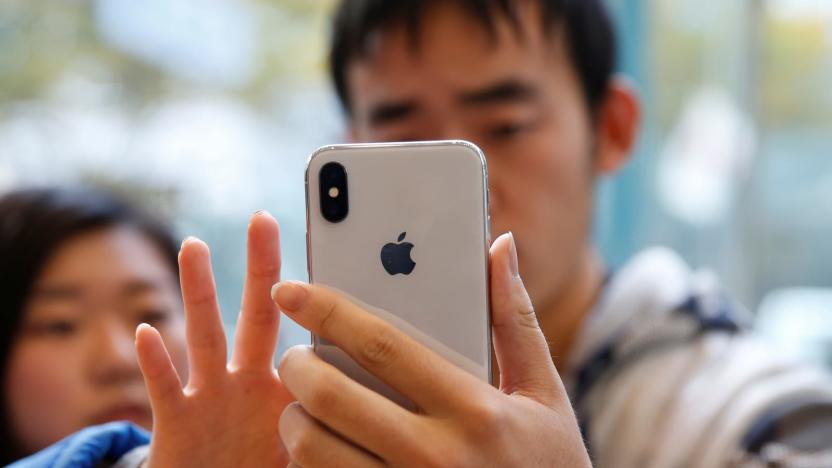
Apple alters its contracts to comply with Japan's antitrust laws
Japan's antitrust regulatory agency just wrapped up an investigation into Apple, and in order to ensure its compliance with the country's antitrust rules, the company will change the sales contracts it has with three of Japan's major mobile service providers. The Japan Fair Trade Commission (JFTC) looked into four sales practices, but just one stuck out as potentially anticompetitive -- Apple's requirement for service providers to offer iPhone subsidies.

Japan’s answer to Amazon is building its own mobile network
Japanese e-commerce platform Rakuten has announced its plan to shake up the mobile business in its home country. Reuters is reporting that the company is applying for a license to offer 4G service, making it Japan's fourth national wireless carrier. Rakuten intends to offer service in 2019, and has a target of gaining 15 million customers, putting it well behind third-placed Softbank, which currently serves 39 million.
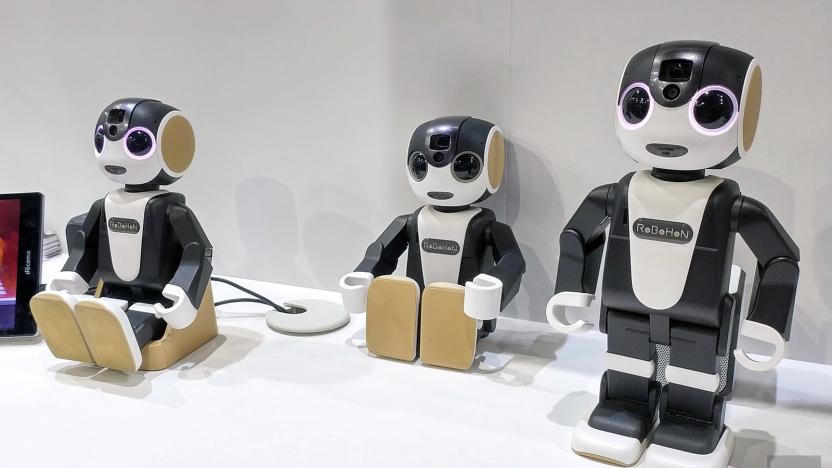
Sharp's smartphone robot gets a more 'affordable' WiFi version
If you've been waiting for a price drop for Sharp's super adorable robot phone, your wait is sort of over. As of October 6th, you can get a RoBoHon for 138,000 yen (excluding tax) which is about $1,230. That's a notable 60,000 yen or $530 drop from the original price, but there's a catch: this new offering doesn't come with cellular function. Apart from that, this WiFi-only RoBoHon (SR-02M-W) is otherwise identical to its LTE counterpart (SR-01M-W), packing the same Snapdragon 400 chipset, Android 5.0 OS, 2GB of RAM, 16GB of storage, an 8-megapixel camera (with 720p video recording), a 720p pico projector in the head, a 1,700 mAh battery and a 2-inch QVGA touchscreen on the back.
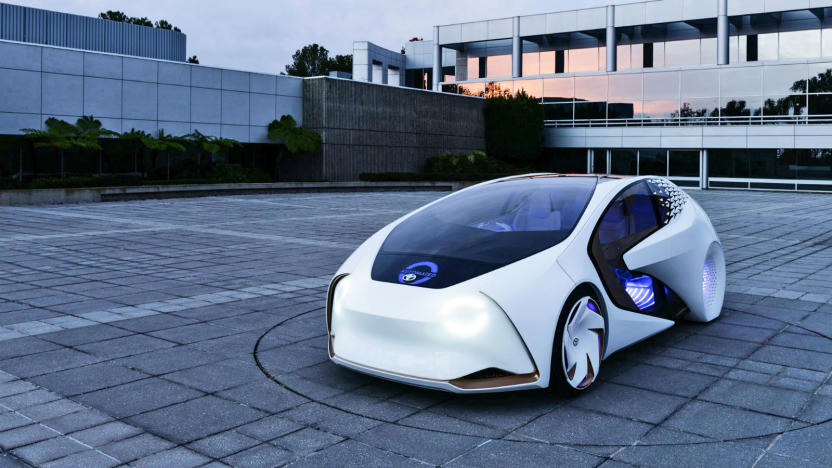
Toyota allies with Intel to develop self-driving car ecosystem
Toyota is teaming up with Intel, and an assortment of tech and automotive firms, to develop an ecosystem for connected cars. By sharing self-driving vehicle data, the companies aim to develop maps and improved driver assistance systems based on cloud computing. Rounding out the alliance (dubbed the "Automotive Edge Computing Consortium") will be Ericsson, Japanese auto parts-maker Denso Corp, and telecoms firm NTT DoCoMo.

Emoji join Dali and van Gogh in New York's MoMA
You might think of emoji as a lowbrow form of communication, but according to MoMA, it's art. The museum added the original 176 emoji, developed by Shigetaka Kurita for Japanese pagers in 1999, to its collection. "With the advent of email in the 1970s ... the conveyance of tone and emotion became both harder and more urgently important," MoMA design specialist Paul Galloway wrote. "When combined with text, these simple images allow for more nuanced intonation."

New phones let Japan's government secretly track its citizens
The Japan Times is reporting that local mobile network NTT DoCoMo is embracing government surveillance. The company launched five new smartphones on Tuesday that lets the authorities to track a user's location without their knowledge or consent. Existing handsets, however, currently alert a user when their position is being accessed by a third party. The move is in reaction to a change in the law back in June 2015 that withdrew the requirement to gain a subscriber's permission before sharing their GPS data.

Indycar driver tests smart shirt to track the perils of racing
Japanese mobile giant NTT DoCoMo's Data arm has revealed that it quietly tested its futuristic smart clothing during Indycar races last year. The firm teamed up with driver Tony Kanaan to create a version of its Hitoe garment that's suitable for use in the sport. As before, the shirt is capable of monitoring its wearer's heart rate and muscle activity, learning valuable insights on how the competition affects the body. For instance, Kanaan's heart rate was found to spike when he brought the car to a stop, and while driving, had the same physical stresses as someone who was sprinting.

Japanese smartphone gets iris-scanning for mobile payments
The common objection to using your phone for purchases is that any sufficiently-motivated criminal could lop off your thumb and go on a spending spree. That's one of the reasons why Japanese carrier NTT DoCoMo and Fujitsu have teamed up to unveil the Arrows NX F-04G. The pair say that it's the world's first smartphone with iris recognition technology that can be used to both unlock a device and certify mobile wallet payments.

Let this shape-shifting baton escort you around town
Don't you hate it when you have to constantly check your phone for map navigation, thus not able to fully enjoy the scenery while travelling? Rather than just switching to audio navigation (which can get annoying after a while), NTT Docomo believes tactile feedback is another possible solution, as demonstrated by its Yubi Navi ("Yubi" meaning finger in Japanese) concept at CEATEC. As you can see in the above GIF image, this simple handheld device can gently twist left and right to give turn directions to your thumb. But there's more: When paired with another Yubi Navi, the two users can simulate the feeling of holding hands by squeezing their own devices, as the lower part of the stick can push a bump up against the palm.

NTT Docomo and Huawei want to augment LTE networks with WiFi spectrum
Love LTE data speeds, but fear the bane of network congestion? Researchers at NTT Docomo and Huawei may have a solution. The two firms just announced that it has successfully broadcast LTE service on the unlicensed 5GHz spectrum -- a frequency typically used for WiFi. Potentially, the 5GHz band could be used to enhance LTE service in high-use areas, a practice researchers are calling License-Assisted Access (LAA). LAA isn't an official standard yet, but Huawei and NTT Docomo plan to continue working together to support it. The specifics are a little granular, sure, but we're not about to scoff at getting better reception. Check out the duo's official statement at the source link below.

Japan: the country where flip-phones refuse to die
The buttons are easier to type on, the battery lasts longer, it's familiar. No, we're not talking about BlackBerry this time, but the Japanese feature phone. Glorious, folding forefather to the smartphone, and the form-factor that gave birth to gara-kei, a shorthand phrase for "Galapagos phones". It's a negative term pointing to devices that simply wouldn't survive outside of Japan. However, it's not stopped the country's biggest carrier, NTT Docomo, from revealing two new feature phone models (and a refreshed paint job for an older phone) just last week. Our Engadget Japanese colleagues were told by Docomo's spokesman that these phones are still so popular with some customers that they practically sell themselves -- many still enter their stores looking for a new flip-phone, not a smartphone.

Japanese phones will soon get alerts for inbound missiles and other attacks
The Japanese get phone alerts for natural disasters, but they have more than that to worry about these days with an occasionally belligerent North Korea just a stone's throw away. Accordingly, Japan's Fire and Disaster Management Agency says that it will soon warn phone owners when there's a hostile missile launch, a terrorist attack or a similar human-made threat to their region. The new alerts will use the disaster technology from before, so residents won't have to worry about software upgrades when the warning system takes effect on April 1st. Locals hopefully won't ever see the system put to use, but it's good to know that it exists. [Image credit: Ignat Gorazd, Flickr]

Japanese 'smart clothing' uses nanofibers to monitor your heart-rate (video)
Japanese mobile carrier NTT Docomo and materials developer Toray have been working on joint projects for a while and now they're publicly announcing one. Welcome Hitoe (Japanese for "one layer"), cloth that contains Toray's nanofibers that are coated in a transmittable layer. It's not the orange cloth (that's just standard material), but the nicotine-patch sized square you attach to it that does the sensing. Place two of these on you and they'll act as electrodes, measuring your heartbeat and even offering metrics resembling a cardiogram. The plan is to connect this cleanly non-invasive health monitor to NTT Docomo's health app platform that's already on its smartphones, developing practical... soft... hardware for sale alongside it. The pitch didn't just include sports clothing, however, with pajamas and other sleepwear planned for launch. Look! There's even a little hat! The sensors will apparently survive tumbles in the washing machine and, having seen an earlier prototype late last year, we can confirm that the patches are suitably lightweight and flexible -- now the work is down to reducing that lumpy hub sensor that we also spotted. Wearable gadgets might finally be going subtle. There's a quick video from our allies at Engadget Japanese after the break.
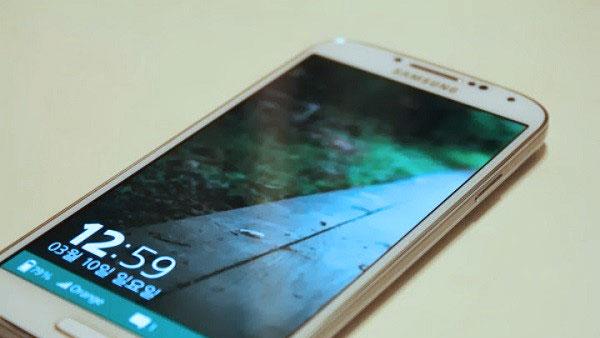
Japanese carrier says it's 'not the right time' for Tizen OS smartphones, delays launch plans
Tizen is trying to make all the right moves when it comes to getting its Tizen mobile OS off the ground and into people's hands. However, to the surprise of... not many people (probably even Samsung), it's going to be a struggle. NTT Docomo has canceled its plans for launching a Tizen smartphone early this year, citing timing as the issue. A spokesperson, talking in a briefing yesterday, told Engadget Japanese that its smartphones sales hadn't increased substantially since the year before (despite this being the first year the carrier has started selling iPhones), stating that there wasn't space for three mobile OSes in Japan's current smartphone climate. It's not ruling out the eventual arrival of Tizen hardware, however. Maybe Docomo is waiting on those new handsets promised to appear in Barcelona. MWC is just a month away.

Looking for a data center tech job? Apple's hiring: News from Jan. 10, 2014
Good evening! Here's the Apple news for Jan. 10, 2014: Apple has posted additional positions for its Oregon-based data center, including data center maintenance techs and a chief engineer for the center. As MacRumors notes, Apple has been seeking that engineer since last year. The story also notes that a land acquisition Apple explored last fall seemed to be geared toward building a solar farm. Apple will open its fourth flagship Beijing store on Saturday. The newest addition to the Apple Store family will be in the Chaoyang district's China Central Place. It's the 10th Apple Store in China. A U.S. appeals court said that Apple did not any of Motorola Mobility's patents in the production of the iPhone, upholding a decision originally handed down in April by the International Trade Commission. Motorola Mobility, now owned by Google, had accused Apple of infringing on six patents that ranged from the proximity sensor to reducing signal noise. NTT Docomo's acquisition of the iPhone helped it surpass the competition for the first time in two years, gaining far more new subscribers than its two biggest rivals thanks to the iPhone 5s and iPhone 5c. "From now, the ranking of the companies will be switching because Docomo offers the iPhone," Satoru Kikuchi, an analyst at SMBC Nikko Securities Inc. in Tokyo told Bloomberg Businessweek. "The iPhone strengthens Docomo's foundation." Path has managed to obtain $25 million in Series C funding, Re/code reported late Friday in an exclusive report. The largest of the backers this go-around is Bakrie Global Group out of Indonesia. Kick back and relax with some of these features: Romo: The cute robot with an iPhone for a brain Wearable tech shows promise but has a long way to go The strange, shady world of $1,000 iOS apps

NTT Docomo's winter lineup arrives, includes Sony Xperia Z1 mini and Samsung Galaxy J
As is tradition this time of year, NTT Docomo's annual winter/spring lineup has just fallen in our laps, unveiling a slew of devices that includes ten smartphones, a tablet, two feature phones, a photo panel and two mobile WiFi routers. On the smartphone front, several standouts include the new LG G2, the Galaxy Note 3, the Sony Xperia Z1, the Sony Xperia Z1 f and the odd Japan-only Samsung Galaxy J. The latter two are of particular interest, as this marks their first official unveiling. The Xperia Z1 f is essentially a miniaturized Xperia Z1 -- it has a 4.3-inch screen instead of a 5-inch one -- and packs in specs that are similar to its bigger brother, such as a 2.2GHz MSM8974 Snapdragon 800 processor and a 20.7-megapixel camera. The Galaxy J, meanwhile, has a 5-inch 1080p Super AMOLED display, a 2.3GHz Snapdragon 800 processor and a 13.2-megapixel camera. Also of note is the Fujitsu Arrows NX-F01F, which has a 5-inch full HD screen, a 2.2Ghz quad-core processor, a 3,200mAh battery, a 13.1-megapixel rear shooter plus a fingerprint scanner. For fans of Disney and Square Enix, there's a special Disney branded phone from Fujitsu plus a Dragon Quest handset that's really just a rebranded Sharp Aquos Zeta. The latter is pre-installed with Dragon Quest VIII: Journey of the Cursed King and is limited to just 30,000 units. The lone tablet on the list is a 10.1-inch Fujitsu Arrows Tab, which happens to be both water- and dust-proof. All smartphones and the tablet are compatible with Docomo's high-speed Xi LTE service, several of which are capable of hitting the 150Mbps maximum download speed. They also come equipped with long-lasting batteries, quad-core CPUs and the docomo LIVE UX home screen application. Though not listed as part of the 16 devices in the release, NTT Docomo also added a couple of wearables to its winter lineup -- the new Samsung Galaxy Gear and a wrist device called "move band" that tracks steps, calorie consumption and sleep hours. All of them are slated to arrive on or after October 11th, though we should note that the Xperia Z1 mini won't arrive until the end of December. If you wish to find out more details on what the Japanese carrier has to offer this holiday season, go on and hit the source link below. Update: We've included a promo video of the Sony Xperia Z1 f below as well.

DoCoMo blames lack of iPhone supply for record subscriber loss
Just a few weeks ago, NTT DoCoMo, Japan's largest mobile carrier, began carrying the iPhone for the first time. Concurrently, DoCoMo this September lost a record number of subscribers to other carriers, 66,800 to be precise. Meanwhile, rival carriers like SoftBank and KDDI added 270,700 and 232,700 new users, respectively. Oddly enough, DoCoMo attributed its subscriber churn to Apple's inability to keep its store shelves stocked with iPhones. Bloomberg reports: DoCoMo attributed the subscriber loss to customers who delayed purchases until after Apple's new mobiles went on sale Sept. 20 and insufficient stock of those handsets, said Atsuko Suzuki, a company spokeswoman. Rival carriers' marketing strategies also hurt sales, she said. Of course, seeing as Apple's new iPhones didn't launch until September 20, it seems like a stretch to attribute DoCoMo's recent subscriber exodus to iPhone supply problems.










